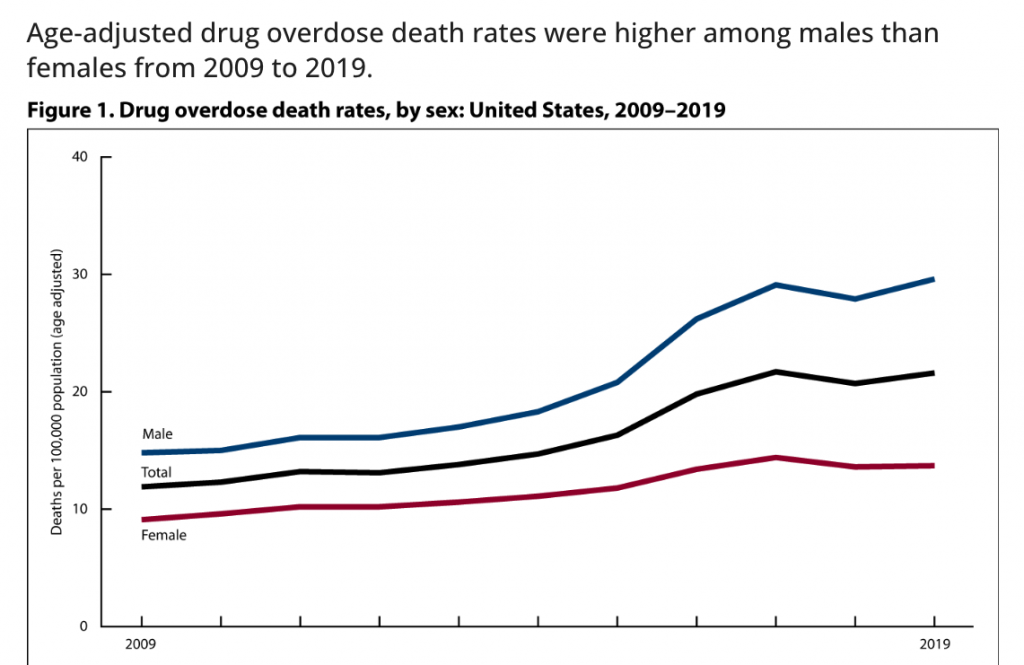International Overdose Awareness Day, or IOAD, is Aug. 31, 2023. A sobering fact is that more than one million US residents have died from a drug overdose in the last 25 years. In 2021 nearly 107,000 people died from drug overdose in the US. The Worldwide death total that year was over 500,000. This rate is continuing to increase so promoting awareness is critical.
Chart courtesy of the Center For Disease Control
From a human perspective this means that there are a tremendous amount of family and friends who are grieving the loss of their loved ones. Let’s discuss how you can best support one of your friends who has experienced this tragedy.
The death of a loved one is always difficult, but when that death results from a drug overdose, the grief can be accompanied by a complex web of emotions, including shock, anger, guilt, and confusion. Navigating these feelings while supporting someone who is mourning can be a challenging endeavor, but your support can provide immense comfort during this trying time. Here are some steps you can take to be there for someone who is grieving a drug overdose death:
Listen Actively and Without Judgment
Don’t avoid the person or the subject. Be patient – Grief from an overdose can be especially complicated, and it may come with a rollercoaster of emotions. Understand that the grieving process might take longer and be more complex.
When they are ready, be there to listen. Let the grieving individual express their emotions without fear of being judged. Remember, grief is deeply personal, and everyone processes loss differently. Be prepared to discuss the positive and the negative
Be there for Them
Don’t avoid them, contact them and try to figure out how to support them. Mail them a card, give them a call, try to contact them. Some people may want to talk about their lost loved one constantly, while others might prefer to remain silent. Be adaptable to their needs and give them the space they require.
Practical support can be helpful because grieving can make daily tasks seem insurmountable. Offer to help with chores, meals, or childcare. Sometimes, small acts of kindness can provide a moment of relief.
Remember to stay in touch as time passes. Grief doesn’t have a specific timeline. Even after the initial shock has passed, your friend or loved one will still need your support. Regularly check in with them, not just in the immediate aftermath but also in the weeks, months, and even years following the loss.
Understand that they may feel shame and embarrassment
Society judges drug users and people may label them as socially marginal. Parents who experience judgment from themselves and others experience a different kind of grief. They might worry about what others think of them and they might agonize over what they could have done differently.
Educate Yourself
Understanding the complexities of addiction can help you provide better support. Addiction is a disease, and it’s important to recognize that the individual who passed away was battling an immensely difficult condition.
If you’re closely connected to the deceased, you might be grieving as well. Attending a support group for those who have lost someone to addiction can help you process your feelings while also gaining insight into how to better support others.
Honor Their Memory
In time, when it feels appropriate, work with the grieving person to find ways to honor the memory of their loved one. This could be through charity work, awareness campaigns, or simply sharing memories and stories.
Help in Lakewood and Longmont
The pain of losing a loved one to a drug overdose is profound and multifaceted. As a supporter, you won’t be able to remove this pain, but you can offer a comforting presence. Through understanding, patience, and compassion, you can be a pillar of strength during one of the most challenging times in someone’s life.
Let’s figure out how to help you. Please contact our Client Care Coordinator for your complimentary 20-minute phone consultation today and read more about our services on the front page of our website.
Self Care Impact Counseling envisions a new age of counseling for adolescents, adults, couples & groups that makes a REAL difference with core values of GROWTH | BALANCE | COMPASSION | INNER HARMONY.

